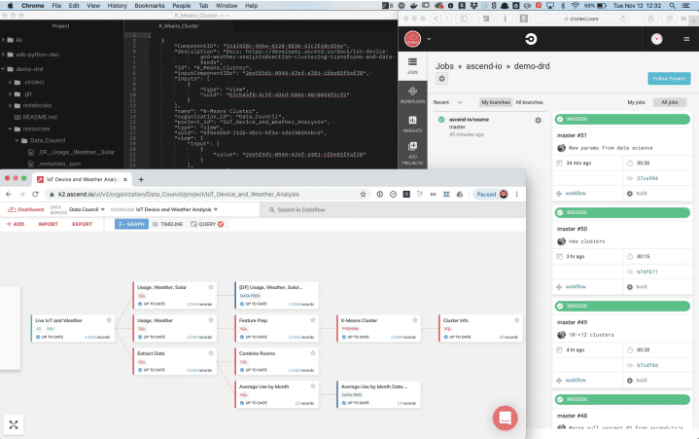Declarative definitions, automated workflow integrations, and zero downtime pipeline deployments provide speed, flexibility, and stability across data lifecycle
PALO ALTO, Calif. – Nov. 12, 2019 – Ascend, provider of the world’s first Autonomous Dataflow Service, today announced the general availability of Declarative Pipeline Workflows, the first and only offering that pairs the flexibility of Pipelines-as-Code with the predictability of declarative data engineering. Data engineers can now describe pipelines with simple, compact definitions that easily integrate into their existing development and CICD tools such as Git, Gitlabs, Github, Jenkins, and CircleCI. Ascend’s declarative approach allows for development and testing without incurring reprocessing costs, as well as safe, predictable productionization – leapfrogging the automation and agility of existing DataOps workflows.
“With Declarative Pipeline Workflows, we are unlocking an entirely new way of thinking about the data development lifecycle that is faster, safer, and more predictable,” said Sean Knapp, founder and CEO of Ascend. “Data engineers can now prototype and develop over the same data as they would in production; commit changes; and automatically stage, test, and release in minutes, meaning fewer surprises and more time actually developing. We’re thrilled to be accelerating the data development lifecycle and fueling a new level of DataOps sophistication.”
Within software development workflows, there are normally development, staging, and production environments to facilitate ongoing development without putting what’s running in production at risk. The rise of DevOps has made this workflow more agile and predictable by moving from imperative infrastructure configuration to declarative, and by replacing manual tests and deployments with automated ones. While modern data development requires similar workflows to keep up with business demands, moving between these stages quickly and safely remains a challenge. Teams are forced to maintain separate infrastructures, run on sample data, and incur repetitive processing costs for each iterative run. Moreover, with the majority of traditional data pipelines yet to leverage declarative engineering methodologies, pipeline deployments remain manual and brittle, consisting of expensive reprocessing, slow data validation checks, and unforeseen risks when merging into production.
Declarative Pipeline Workflows finally enables DataOps initiatives to catch up to the agility and predictability of DevOps. Now data engineers can rapidly branch, edit, and deploy data pipelines with existing developer workflows and tools in a fraction of the time. Backed by Ascend’s Dataflow Control Plane and Structured Data Lake, all data processing activity is deduplicated and optimized, allowing for faster iterations, smarter backfills, and lower overall development costs. Finally, production deployments can be performed safely with zero downtime or pipeline disruption – bringing increased agility and reliability to modern DataOps.
“At Mayvenn, we are creating the future of salon retail. Data is core to how we deliver on that both from optimizing the direct-to-consumer experience and connecting them to the beauty professionals,” said Sheel Choksi, Director of Ops at Mayvenn. “As a small team, we can’t afford slow iteration cycles or risk disruption to downstream applications that rely on our events data pipelines. We’re thrilled about the launch of Declarative Pipeline Workflows, as it will enable our team to develop quickly and deploy to production safely in a way never before possible. And, being able to drop this within our existing workflows guarantees seamless adoption so the team can start reaping the benefits immediately.”





